Trends in the South-1A
Page 60
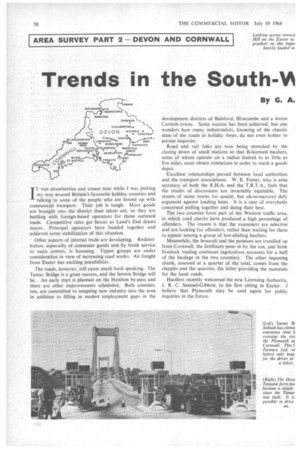
Page 61
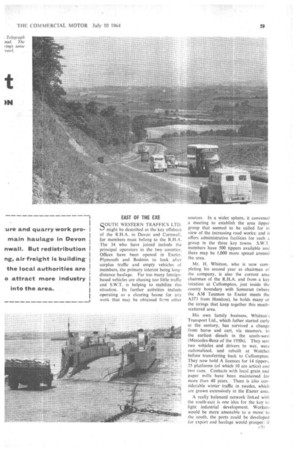
Page 62
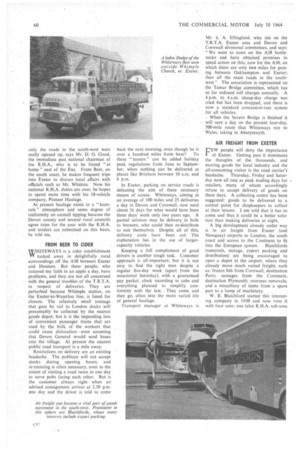
Page 63
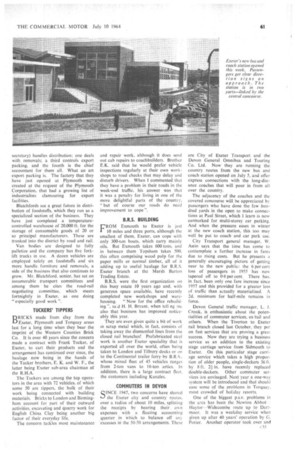
Page 64
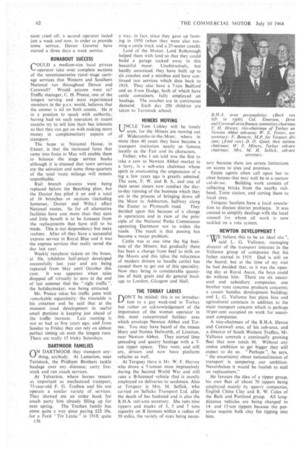
If you've noticed an error in this article please click here to report it so we can fix it.
IT was strawberries arid cream time while 1 was picking my way around Britain's favourite holiday counties and talking to some of the people who are bound up with commercial transport. Their job is tough. More goods are brought into the district than taken out, so they are battling with foreign-based operators for those outward loads. Competitive rates get fiercer as Land's End draws nearer. Principal operators have banded together and achieved some stabilization of this situation.
Other aspects of internal trade are developing. Redistribution, especially of consumer goods sent by trunk service to main centres, is booming. Tipper groups are -under consideration in view of increasing road works. Air freight from Exeter has exciting possibilities.
The roads, however, still cause much hard speaking. The Tamar Bridge is a great success, and the Severn Bridge will be. Art early start is planned on the Honiton by-pass and there are other improvements scheduled. Both counties, too, are committed to tempting new industry into the area in addition to filling in modest employment gaps in the development districts of Bideford, Ilfracombe and a dozen Cornish. towns. Some success has been achieved; but one wonders how many industrialists, knowing of the chaotic state of the roads at holiday times, do not even bother to pursue inquiries.
Road and rail links are now being stretched by the closing down of small stations so that B-licensed hauliers, some of whom operate on a radius limited to as little as five miles, must obtain extensions in order to reach a goods depot.
Excellent relationships prevail between local authorities and the transport associations. W. E. Foster, who is area secretary of both the R.H.A. and the T.R.T.A., feels that the results of discussions are invariably equitable. The streets of some towns (so quaint, but oh-so-narrow) defy argument against loading bans. It is a case of everybody concerned pulling together and doing their best.
The two counties form part of the Western traffic area, in which road checks have produced a high percentage of offenders. The reason is that the examiners are selective and are looking for offenders, rather than waiting for them to appear among a group of law-abiding hauliers.
Meanwhile, the broccoli and the potatoes are trundled up from Cornwall, the fertilizers pour in by the ton, and brisk livestock trading continues (agriculture accounts for a half of the haulage in the two counties). The other imposing chunk, assessed at a quarter of the total, comes from the claypits and the quarries, the latter providing the materials for the local roads.
Hauliers recently welcomed the new Licensing Authority, J. R. C. Samuel-Gibbon, to his first sitting in Exeter. believe that Plymouth may be used again for public inquiries in the future.
EAST OF THE EXE QOUTE1 WESTERN TRAFFICS LTD.
might be described as the key offshoot of the R.H.A. in Devon and Cornwall, for members must belong to the R.H.A. The 34 who have joined include the principal operators in the two counties. Offices have been opened in Exeter. Plymouth and Bodmin to look after surplus traffic and empty vehicles of members, the primary interest being longdistance haulage. Far too many foreignbased vehicles are chasing too little traffic and S.W.T. is helping to stabilize this situation. Its further activities include operating as a clearing house for any work that may be obtained from other
sources. In a wider sphere, it convened a meeting to establish the area tipper group that seemed to be called for in view of the increasing road works; and it offers administrative facilities for such a group in the three key towns. S.W.T. members have 500 tippers available and there may be 1,000 more spread around the area.
Mr. H. Whitton, who is now completing his second year as chairman or the company, is also the current area chairman of the R.H.A. and from a key location at Cullompton, just inside the county boundary with Somerset (where the A38 Taunton to Exeter meets the A373 from Honiton), he holds many of the strings that keep together this muchscattered area.
His own family business, Whitton's Transport Ltd., which father started early in the century, has survived a change from horse and cart, via steamers, to the earliest diesels in the south-west (Mercedes-Benz of the I930s). They sent two vehicles and drivers to war, were nationalized, and rebuilt at Watchet before transferring back to Cullompton. They now hold A licences for 14 tippers. 25 platforms (of which 10 are artics) and two vans. Contacts with local grain and paper mills have been maintained for more than -40 years. There is alio considerable winter traffic in swedes, which are grown extensively in the Exeter area.
A really balanced network linked with the south-east is one idea for the key to light industrial development. Worker; would be more amenable to amove'. to the south, the ports could be developed for export and haulage would prosper: it
only the roads to the south-west were really opened up, says Mr. D. 0. Good, the immediate past national chairman of the R.H.A., who is to be found "at home" east of the Exc. From Beer, on the south coast, he makes frequent trips into Exeter to discuss local affairs with officials such as Mr, Whitton. Now his national R.H.A. duties are over, he hopes to spend more time with his 18-vehicle company, Pioneer Haulage.
At preient haulage exists in a " keenrate " atmosphere and some degree of 'uniformity on council tipping because the Devon countyand 'several rural councils agree rates for the year with the R.H.A. and tenders are submitted on this basis, he told me.
FROM BEER TO CIDER
WHITEWAYS is a cider. establishment VV nicked away in delightfully rural surroundings off the A30 between Exeter and Honiton. But these people, who restored• my faith in an apple a day, have problems, and they are not all concerned with the general troubles of the T.R.T.A. in respect of deliveries. They are perturbed because Whimple station, on the Exeter-to-Waterloo line, is listed for closure. The relatively small tonnage that goes by rail to London docks will presumably be collected by the nearest goods depot; but it is the impending foss of convenient passenger trains that are used by the bulk of the workers that could cause dislocation—even assuming that Devon General• would send buses into the village. At present the nearest public road transport is a mile away.
Restrictions on delivery are an existing headache. The publican will not accept stocks during opening hours, and re-routeing is often necessary, even to the extent of visiting a road twice in one day to serve pubs facing each other. But is the customer always right when an advised consignment arrives at 2.30 p.m. one day and the driver is told to come back the next morning, even though he is over a hundred miles from base? To these "teasers" can be added holiday peak regulations from June to September, when nothing can be delivered at places like Brixham between 10 a.m. and 6 p.m.
In Exeter, parking on service roads is defeating the aim of these necessary means of access. Whiteways, aiming at an average of 100 miles and 25 deliveries a day in Devon and Cornwall, now need about 3+ days for what would have been three days' work only two years ago. A partial solution may be delivery in bulk to brewers, who could then re-distribute to suit themselves. Despite all of this, delivery costs have been cut. .The explanation lies in the use of largercapacity vehicles.
Keeping a full complement of good drivers is another tough task. Customer approach is all-important; but it is not easy to find the right men despite a regular five-day week (apart from the occasional Saturday), with a guaranteed pay packet, clock recording in cabs and everything planned to simplify conformity with the law.. They come and they go, ften into the more varied life of general haulage.
Transport manager at Whiteways is Mr. S. A. Ellingford, who sits on the T;R.T.A. Exeter area and Devon and Cornwall divisional committees, and says: "We went to town on the A38 bottlenecks and have obtained promises to speed action on this; now for the A30, on which there are only two miles for passing between Oakhampton and Exeter; then all the main roads in the southwest." The association is represented on the Tamar Bridge committee, which has so far reduced •toll charges annually. A 4 p.m. to 4 a.m cheap-day charge was tried but has been dropped, and there is now a standard concession-rate system for all vehicles.
• When the Severn Bridge is finished it will save a day on the present four-day, 700-mile route that Whiteways run to Wales, taking in Aberystwyth.
AIR FREIGHT FROM EXETER
F'people will deny the importance of Exeter. Getting past it dominates the thoughts of the thousands, and moving goods for local industry and the all-consuming visitor is the road carrier's headache. Thursday, Friday and Saturday now all rate as peak trading days for retailers, many of whom accordingly refuse to accept delivery of goods on these days. A collecting centre has been suggested: goods to be delivered to a central point for shopkeepers to collect at their leisure: I am told that it has to come and that it could be a better solution than making deliveries at night.
A .big development already under way is in air freight from Exeter (and Newquay) airports to London, the south coast and across to the Continent to fit into the European system. Blatchfords (removals, storage, export packing and distribution) are being encouraged to open a depot at the airport, where they already move much varied freight, such as: frozen fish from Cornwall, destination Paris; sausages from the Continent, destination Plymouth; overseas removals; and a miscellany of items from a spare part to a lump of machinery.
W. E. Blatchford started this interesting company in 1930 and now runs it with four sons: one (also R.1-LA. sub-area
secretary) handles distribution; one deals with removals; a third controls export packing, and the fourth is the chief accountant for them all. What an art export packing is. The factory that they have just opened at Plymouth was created at the request of the Plymouth Corporation, that had a growing list of industrialists clamouring for export facilities.
Blatchtords see a great future in distribution of foodstuffs, which they run as a specialized section of the business. They have just completed a temperaturecontrolled warehouse of 20,000 It. for the storage of consumable goods of 20 or so principal manufacturers. These are trunked into the district by road and rail.
Van bodies are designed to fully palletize and the company has five forklift trucks in use. A dozen vehicles are employed solely on foodstuffs and six more handle. furniture and removals, a side of the business that also continues to grow. Mr. Blatchford, senior, has sat on innumerable transport committees and among them he cites the road-rail negotiating committee, which meets fortnightly in Exeter, as one doing "especially good work ".
TUCKERS TIPPERS
11–) RICKS made from clay, from the Exeter, Plymouth and Torquay areas last for .a tong time when they bear the imprint of the Western Counties Brick Co. It is over 40 years since the concern made a contract with Frank Tucker, of Exeter, to cart their, products and the arrangement has continued ever since, the haulage now being in the .hands of the Tucker brothers, E. K. and W. F., the latter being Exeter sub-area chairman of the R.H.A.
The Tuckers are among the top operators in the area with 72 vehicles, of which some 50 are tippers, the bulk of their work being connected with building materials. Bricks to London and Birmingham account for part of their outward activities, excavating and quarry work for English China Clay being another big factor of their everyday life.
The concern tackles most maintenance and repair work, although it does send out cab repairs to coachbuilders. Brother E.K. said that he would prefer vehicle inspections regularly at their own workshops to road checks that may delay and disturb drivers. When I commented that they have a problem in their roads in the week-end traffic. his answer was that it was a penalty for living in one of the more delightful parts of the country, "but of course our roads do need improvement to cope".
B.R.S. BUILDING
'FROM Exmouth to Exeter is just I 10 miles and three ports, although the smallest of them, Exeter, can cope with only 300-ton boats, which carry mainly oils. But Exmouth takes 600 tons, and in between them Topsham takes 500. this often comprising wood pulp for the paper mills or normal timber, all of it adding up to useful haulage for B.R.S. Exeter branch at the Marsh Barton Trading Estate.
B.R.S. were the first organization on this busy estate 10 years ago and. with generous space available, have recently completed new workshops and ware
housing. "Now for the office rebuilding ", said I-I. H. Bryant, when tell ng me also that business has improved noticeably this year.
. They are even given quite a bit of work in scrap metal which, in. fact, consists of taking away the dismantled lines from the closed rail branches! Prefabricated steel work is another Exeter speciality that is exported all over the world,. often being taken to London and Tilbury. docks or on to the Continental trailer ferry. by B.R.S.. whose. mixed fleet of 45 vehicles, ranges from 2-ton vans to 16-ton artics. In addition, there is a large contract fleet. the customers' including Kunzles.
COMMUTERS IN DEVON
S1NCE .1947, two concerns have shared the Exeter city and country routes, over a radius otabout 10 miles, splitting the receipts by bearing their own expenses with a floating accounting quarter, in Which . to balance off any excese. iii the 50-50 arrangements. These
are City of Exeter Transport and the Devon General Omnibus and Touring Co. Ltd. Now they are running the country routes from the new bus and coach station opened on July 5, and offer express connections with the long-distance coaches that will pour in from all over the country.
The adjacency of the coaches and the covered concourse will be appreciated by passengers who have done the few hundred yards in the open to make connections at Paul Street, which I learn is now earmarked for multi-storey car parking. And when the pressure eases in winter at the new coach station, this too may well be put to coachand car park use.
City Transport general manager, W. Astin says that the time has come to contemplate a further increase in Fares due to rising costs. But he presents a generally encouraging picture of getting near to the new public: the 6 per cent loss of passengers in 1955 has now tapered off to 0-8 per cent. There has, in fact, been only one fare increase since 1957 and this provided for a greater loss of traffic than actually materialized. A 2d minimum for half-mile remains in force.
Devon General traffic manager, L. J. Crook, is enthusiastic about the potentialities of commuter services. ex-rail and others. When the Tiverton to Exeter rail branch closed last October, they put on fast services that are proving a great success. Now they are trying a business service as an addition to the existing stage carriage service from Sidmouth to Exeter. On this particular stage carriage service which takes a high proportion of older people, single-deckers 36 ft. by 8 ft. 21 in. have recently replaced double-deckers. Other commuter services are envisaged. Next year a one-way system will be introduced and that should ease sonic of the problems in Torquay, most crowded of holiday resorts.
One of the biggest p.s.v. problems in the area has been the Newton Abbot Haytor—Widecombe route up to Dartmoor. It was a weekday service when given up after 40 years' operation by G. Potter. Another operator took over and soon cried off; a second operator lasted just a week and now, in order to provide some service, Devon General have started a three days a week service.
RUNABOUT SUCCESS
CWAD a medium-size local private operator take over complete sections of the unremunerative ruralstage carriage services that Western and Southern National fun throughout Devon and Cornwall? Would anyone want to? Traffic manager, C. H. Preece, one of the longest serving and most experienced members in the p.s.v. world, believes that the answer is nil on both counts. He is in a position to speak with authority, having had six such Operators in recent months try to sell him their .bus interests so that they can get on with making more money in complementary aspects of transport.
The hope at National House, in Exeter, is that the increased fares that came into force in May will enable them to balance the stage service books although it is stressed that town services are the salvation and some three-quarters of the total 'route mileage will remain unprofitable.
. Rail branch closures were being replaced before the Beeching plan,. but the Doctor has piled it on and a total of 34 branches or sections •(including Somerset, Dorset and Wilts.) affect National routes. So .far all 'alternative facilities have cost more than they earn and little benefit is to be foreseen from the replacements that have still to be made. This is not despondency but mere realism. After all they have a. successful express service in Royal Blue and it was the express services that reallysaved the day last year.
Weekly runabout tickets on the buses. . at 30s. (children half-price) developed successfully last year and are being repeated from May until October this year. It was apparent when sales dropped off virtually to zero at the end of last summer that the "right traffic", the holidaymaker, was being attracted.
Mr. Preece takes his traffic jams with remarkable equanimity: the timetable is his criterion and he said that at the moment road development in useful small portions is keeping just ahead of the traffic increase. Late running is • not so bad as five years ago, and from Sunday to Friday they can rely on althost perfect timing on even the longest runs. There are really 15 tricky Saturdays.
DARTMOOR FAMILIES
ON DARTMOOR they transport anything, anybody. At Lanierton, near Tavistock, the Pridham Brothers tackle haulage over any -distance; carry livestock and run coach services.
At Yelverton, where horses remain as important as mechanized transport, 73-year-old F. G. Trathen and his son operate .a similar variety of services. They showed me an order book for coach party hire already filling up for next spring. The Trathen family has come quite a way since paying .£22 10s, for a Ford "Tin. Lizzie " in 1918; quite (-36
a way, in fact, since they gave up farming in 1950 (when they were also runfling a cattle truck and a 25-seater coach).
Lord of the Manor. Lord Roborough helped them with land so that they could build a garage tucked away in this beautiful moor. Unobtrusively, but hardly unnoticed, they have built up to six coaches and a minibus and have continued taxi services which date back to 1918. They also have a 7-ton Bedford and an 8-ton Dodge. both of which have cattle ,containers, fully employed on haulage. The coaches are in continuous demand. Each day 200 children are taken to Tavistock school.
MINERS MOVING
UNCLE Tom Cobley will be lonely soon, for the Miners are moving out of Widecombe-in-the-Moor. where in more than 40 years they have become a transport institution nearly as famous locally, as the Fair and its characters.
Father, who I am told was the first to take a cow to Newton Abbot market in a lorry, is a sub-area chairman whose spirit in overcoming the amputation of a leg a few years ago is greatly admired. The sons, F. W. and B. S.,' and one of their seven sisters now conduct the dayto-day running of the business which they are in the process of bringing down off the Moor to Ashburton, halfway along the Exeter to Plymouth road. They decided upon this because of a change in operations and in view of the prin: ciple of the National Parks Commission operating Dartmoor not to widen the roads. The result is that passing has become a major problem.
Cattle was at one time the big business of the Miners; but gradually there has been a change from beef to milk on the Moors and this (plus the reluctance of modern drivers to handle cattle) has caused them to get out of this specisiity. Now they bring in considerable quantities of bulk grain and do general haulage to London, Glasgow and Hull.
THE TORBAY LADIES THE TORBAY LADIES
DON'T be misled; this is no introduction to a gay week-end in Torbay hut rather an acknowledgement of the importance of the woman operator in this most concentrated holiday area which envelops Newton Abbot and Totnes. You may have heard of the misses Mary and Norma Halworth, of Liverton, near Newton Abbot. They started lime spreading and quarry haulage with a 7ton tipper apiece. They were, and still are, drivers and now have platform vehicles as well.
At Torquay there is Mr. W. F. Harvey who drove a 5-tonner most impressively during the Second World War and still runs a B-licensed vehicle that is mostly employed on deliveries to seedsmen. Also at Torquay is Mrs. M. Sellick, who carried on Sellicks Transport Ltd. after the death of her husband and is also the R.H.A. sub-area secretary. She runs nine tippers and trucks of 3, 5 and 7 tons capacity on B licences within a radius of 50 miles, the variety of sizes being neces sary because there are severe limitations on access to' sites and premises.
Estate agents often call upon her to clear houses that may well be in a narrow
cul-de.sac. Building work consists of collecting .bricks from the nearby railhead, Torrestation, and carting them to local siteS.
. Torquay .hauliers have a local association tO discuss district problems. It was created to simplify dealings with the local council for whom all work is now tackled on a rota system.
NEWTON DEVELOPMENT?
Li believe this to be an ideal site ", WEsaid L. G. Valiance, managing director of the transport interests in the Valiance group of companies that his father started in 1919. Dad is still on the board; but at the time of my visit he had decided that, as it was the opening day at Royal Ascot, the boys could do without him. There are six associated and subsidiary companies: one brother runs concrete products concerns; a cousin handles development building; and L. G. Valiance has plant hire and agricultural contracts in addition to the main transport concern which is perhaps 10 per cent occupied on work for associated companies.
A vice-chairman of the R.H.A. Devon and Cornwall area, of his sub-area, and a director of South Western Traffics, Mr. Valiance controls a continually growing fleet that now totals 86. Without any undue ambition to get bigger they still expect to do so. "Perhaps ", he says, "the uncertainty about nationalization of transport is tempering our ambition. Nevertheless it would be foolish to stall on replacement."
He favours the idea of a tipper group, his own fleet of about 70 tippers being employed mainly by quarry companies, English China Clay and R. W. Coles of the Bath and Portland group. All longdistance vehicles are being changed to 14and 15-ton tippers because the potteries require bulk clay for tipping into bins.
























































































































